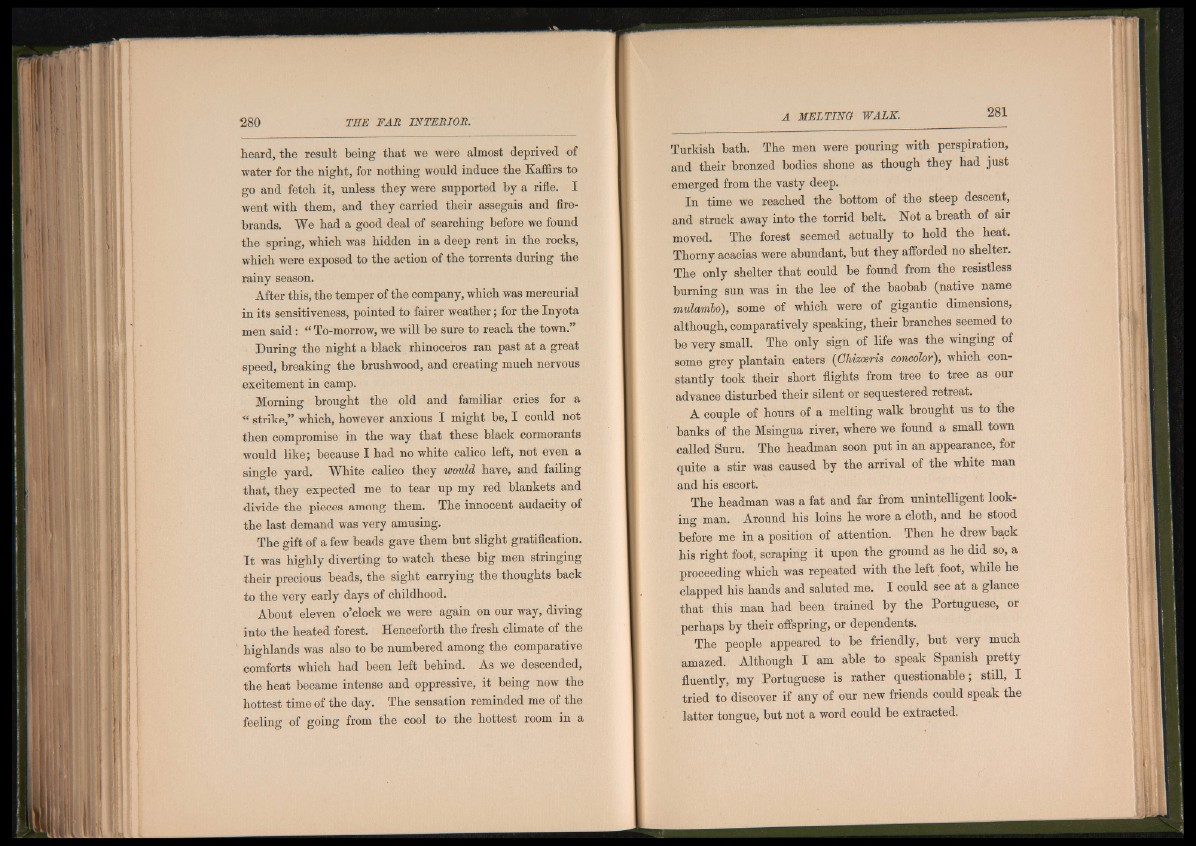
heard, the result being that we were almost deprived of
water for the night, f°r nothing would induce the Kaffirs to
go and fetch it, unless they were supported by a rifle. I
went with them, and they carried their assegais and firebrands.
We had a good deal of searching before we found
the spring, which was hidden in a deep rent in the rocks,
which were exposed to the action of the torrents during the
rainy season.
After this, the temper of the company, which was mercurial
in its sensitiveness, pointed to fairer weather; for the Inyota
men said: “ To-morrow, we will be sure to reach the town.”
During the night a black rhinoceros ran past at a great
speed, breaking the brushwood, and creating much nervous
excitement in camp.
Morning brought the old and familiar cries for a
“ strike,” which, however anxious I might he, I could not
then compromise in the way that these black cormorants
would like; because I had no white calico left, not even a
single yard. White calico they would have, and failing
that, they expected me to tear up my red blankets and
■divide the pieces among them. The innocent audacity of
the last demand was very amusing.
The gift of a few beads gave them hut slight gratification.
I t was highly diverting to watch these big men stringing
their precious beads, the sight carrying the thoughts back
to the very early days of childhood.
About eleven o’clock we were again on our way, diving
into the heated forest. Henceforth the fresh climate of the
highlands was also to he numbered among the comparative
comforts which had been left behind. As we descended,
the heat became intense and oppressive, it being now the
hottest time of the day. The sensation reminded me of the
feeling of going from the cool to the hottest room in a
Turkish hath. The men were pouring with perspiration,
and their bronzed bodies shone as though they had just
emerged from the vasty deep.
In time we reached the bottom of the steep descent,
and struck away into the torrid belt. Not a breath of air
moved. The forest seemed actually to hold the heat.
Thorny acacias were abundant, but they afforded no shelter.
The only shelter that could he found from the resistless
burning sun was in the lee of the baobab (native name
mulambo), some of which were of gigantic dimensions,
although, comparatively speaking, their branches seemed to
be very small. The only sign of life was the winging of
some grey plantain eaters (Chizoeris concolor), which constantly
took their short flights from tree to tree as our
advance disturbed their silent or sequestered retreat.
A couple of hours of a melting walk brought us to the
banks of the Msingua river, where we found a small town
called Suru. The headman soon put in an appearance, for
quite a stir was caused by the arrival of the white man
and his escort.
The headman was a fat and far from unintelligent looking
man. Around his loins he wore a cloth, and he stood
before me in a position of attention. Then he drew back
his right foot, scraping it upon the ground as he did so, a
proceeding which was repeated with the left foot, while he
clapped his hands and saluted me. I could see at a glance
that this man had been trained by the Portuguese, or
perhaps by their offspring, or dependents.
The people appeared to be friendly, but very much
amazed. Although I am able to speak Spanish pretty
fluently, my Portuguese is rather questionable; still, I
tried to discover if any of our new friends could speak the
latter tongue, but not a word could be extracted.